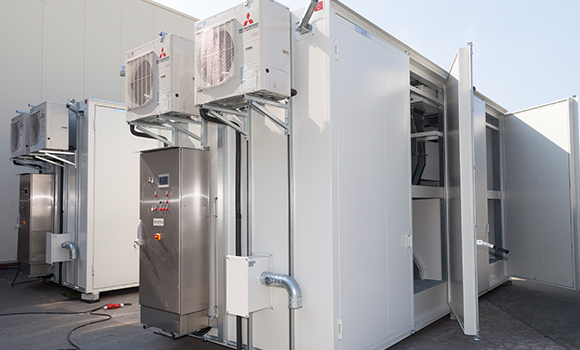Using ORBIS PCC instead of Excel: DENIOS integrates manufacturing costs calculation into SAP and optimizes the quotation process
Sectors: Manufacturing industry, Mechanical and plant engineering
Processes: Finance & Controlling
References: DENIOS SE
DENIOS SE is using the ORBIS Product Cost Calculator (ORBIS PCC) integrated into SAP ECC and, more recently, seamlessly in SAP S/4HANA, to calculate manufacturing costs in its Engineered Solutions division.
Sector: Storage of hazardous substances, occupational safety and industrial supplies
Production sites: 6 production sites
Products: Sump trays, hazardous substance cabinets, binding agents, drum handling and much more
Employees: approx. 1000 worldwide
Website: www.denios.de
DENIOS SE is using the ORBIS Product Cost Calculator (ORBIS PCC) integrated into SAP ECC and, more recently, seamlessly in SAP S/4HANA, to calculate manufacturing costs in its Engineered Solutions division. The adjustments to ORBIS PCC during the migration to SAP S/4HANA were completed quickly. So calculating multi-variant products and systems for storing hazardous materials or for air and purification technology is based on a standardized database, making it highly efficient and transparent. This has also improved communication between Engineering and Sales, at the same time as optimizing the quotation process.
Chemical accidents that have severe consequences for the environment, and thus for human health and even lives, sadly continue to occur. One of the worst disasters of this kind happened in 1986, when toxic firefighting water run off into the River Rhine, causing mass death among fish populations. That same year, Helmut Dennig established DENIOS SE, which specializes in developing and manufacturing room systems for safe and legally compliant hazardous materials storage, hazardous materials handling, workplace safety, and industrial environmental protection.
The hazardous materials specialist is managing growth with SAP
The corporate group headquartered in Bad Oeynhausen, Westphalia, has experienced continuous growth ever since then. Today, it has six production sites and 25 subsidiaries across Europe, China and the US, and generated revenues of more than €190 million in 2018 with around 950 staff. To sustainably strengthen its position on the market, the Group requires the highest-quality solutions and services, not to mention constant product innovations (the key phrase here being “Industry 4.0 connectivity”). Equally important are efficient business processes in all divisions, running harmoniously across all sites with IT support. So the use of SAP software is a key component of DENIOS SE’s business and IT strategy. Since completing a system conversion from SAP ECC to SAP S/4HANA in early 2020, DENIOS has been benefiting from the advantages of this latest-generation real-time ERP suite.
Calculating manufacturing costs with the help of IT
To meet specific process requirements, the hazardous materials handling and storage specialist also uses SAP-based add-ons. It uses the ORBIS Product Cost Calculator (ORBIS PCC) to calculate manufacturing costs in the Engineered Solutions division, which develops and manufactures room systems for hazardous materials storage, thermal technology, and air and purification technology systems. Using this solution from ORBIS SE, DENIOS transparently and efficiently conducts calculations based on standardized and current data. ORBIS PCC, which DENIOS was already using with SAP ECC, has been extremely successfully utilized in SAP S/4HANA since the migration. The process of migrating the add-on system was very straightforward. The necessary adjustments to ORBIS PCC for running on SAP S/4HANA were completed in a matter of minutes.
Source Photo: © DENIOS SE


„IT-supported and standardized calculations in ORBIS PCC replace the previously laborious and time-consuming process of copying data back and forth between Microsoft Excel and SAP. So we can respond to requests for quotations far more quickly. Since we manufacture hazardous materials storage facilities and room systems to suit customer specifications, with thousands of variants available for each product, this is a business-critical factor,”
Boris Masuch, SAP Consultant Sales, DENIOS SE
The available product variants differ, for example, in terms of size, doors (sliding, hinged, rolling), interior fittings, climate control, and ventilation systems, or the language of the circuit diagram. As was previously the case in SAP ECC, and now also in SAP S/4HANA, standard variant management is still handled in Variant Configuration (LO-VC), while non-standard variants are managed in ORBIS PCC.
Reusing calculations made easy
Since ORBIS PCC is seamlessly integrated with SAP, this enables direct “real-time access” to required data from a variety of sources, including LO-VC: bills of materials, routings and, above all else, the stored product and object dependencies, to name but a few examples. Thanks to the dynamic search function, saved calculations that were created with ORBIS PCC can be quickly located using the characteristics and attributes stored there for hazardous materials storage facilities. Since DENIOS creates calculations individually, but can often draw on existing characteristic variants, this is a major advantage. Every calculation created with ORBIS PCC, along with its associated data, is stored in the SAP software, so it can be reused at any time.
“This is an invaluable advantage too. It allows us to draw on the know-how we acquired for technically implementing special requirements and create calculations for follow-up orders or similar projects with far less effort than before,” explained Mr. Masuch.
Modifications or deviations in the individual versions of calculations can then be quickly and easily tracked using the calculation comparison feature in ORBIS PCC.
For economic reasons, DENIOS only manufactures certain new components following order placement. Since these parts do not yet have material numbers in the SAP software, a placeholder with an estimated price is created in LO-VC and used for calculation in ORBIS PCC – which is another major benefit. Once the final material price is fed into SAP, the “dummy” is replaced by the correct entry.
A significantly optimized quotation process
“Using ORBIS PCC significantly shortens the throughput time. We can create more calculations in the same period of time than before and respond more quickly to customers’ requests for quotations. Thanks to the add-on, communication between Engineering (which creates the calculation) and Sales (which determines the sales price) has noticeably improved too. All in all, this means that the quotation process has been significantly optimized,” explained Mr. Masuch.
But how does that work in practice? To create a quotation for a hazardous materials storage facility or a room system, the product is first of all configured in LO-VC wherever possible. If, on the other hand, there are too many deviations between customer requirements, previously designed models outside of Variant Configuration are used. A model can also be created from scratch if necessary. The configuration result, including the bill of materials structure and quotation items plus surcharges, is available to end users from Engineering directly in ORBIS PCC, and material prices can be modified there at any time if required. Once the calculation is complete, relevant quotation items and header data are exported from the add-on to a special Excel solution, which is used exclusively by Sales to set the sales price and calculate the profit margin, but does not allow any changes to be made to the calculation itself. In addition, the technically highly complex and thus detailed quotations are currently still created outside of SAP S/4HANA in an Office application for practical reasons.
Quotations at the touch of a button in future
When implementing ORBIS PCC, DENIOS relied on the consulting and process expertise of ORBIS AG. Thanks to the expertise of the Saarbrücken-based experts and the collaborative partnership with the DENIOS team, implementation (including the achievement of individual requirements, such as the dynamic search function for characteristics and attributes) proceeded swiftly.
„With ORBIS PCC, we are enhancing the efficiency and transparency of the process of calculating manufacturing costs. at the same time, we are taking another step towards standardizing our it landscape,” continued Mr. Masuch, summing up the situation positively.
But that’s not all. Rollout to all subsidiaries that expect tangible benefits is planned for the future. In the long term, it should also be possible to generate quotations at the touch of a button from within the add-on and to create orders automatically.





